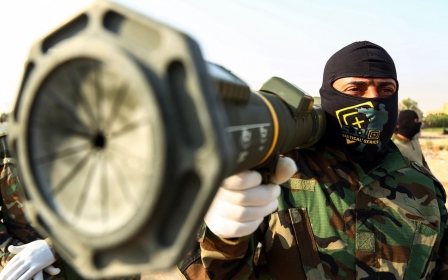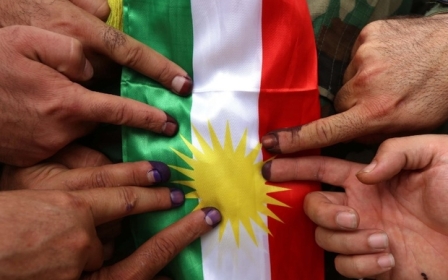
Despite the euphoria in Baghdad, Iraq's revival is far from secure
In 2017, Iraq can count two major achievements. It finally liberated its second largest city, Mosul, from the Islamic State (IS) in July and stifled the Kurdish drive for independence following the Kurdistan independence referendum of 25 September.
Unfortunately, the Iraqi central government has squandered some important opportunities to show its people that it is committed to an inclusive and non-sectarian governance model
Those achievements boosted the confidence of the political elites in Baghdad. The country is increasingly attracting positive media coverage. The Iraqi Prime Minister Haidar Abadi has even made it into Foreign Policy magazine's Top 100 Global Thinkers list for 2017. The magazine described his achievements as follows:
“Over the past year, he has driven the Islamic State out of Iraq’s cities, launched plans to reform the country’s massive and corrupt public sector, and mapped out a foreign policy aimed at preventing Iraq from being used as a battleground for regional powers. Abadi’s most important victory in 2017 was the liberation of Mosul, Iraq’s second-largest city, in July. Abadi’s bid to keep Iraq united has required him to combat more than just jihadis. In October, after the Kurds held an independence referendum, he greenlit a successful operation to retake the disputed oil-rich region of Kirkuk from the Peshmerga.”
Pyrrhic victories
On top of these successes, some analysts have suggested that we are witnessing the revival of a civic Iraqi identity or nationalism that goes beyond and above sectarian identities.
A measured dose of self-confidence is healthy and necessary in the Middle East. Yet such self-confidence can bear deleterious results if it turns into overconfidence or hubris. Middle Eastern political history is awash with such instances of over-confidence, which have produced Pyrrhic victories.
Iraq and the prime minister himself seem to be facing such a danger. Several incidents that took place recently do not point to a wise leadership capable of capitalising on these recent victories to achieve stability, social peace and cohesion among different components of Iraqi society.
Unfortunately, the Iraqi central government has squandered some important opportunities to show its people that it is committed to an inclusive and non-sectarian governance model. For instance, what can an earthquake reveal? The tragedy, misery, nature of governance, the level of responsibility of the political class? The list could go on.
But an earthquake can also clearly bring to the fore the socio-political faultlines of a country and the quality of its political elites.
Abadi had a golden opportunity to show to Iraqis in general and the Kurds in particular that his government could go beyond ethnic and sectarian identities in serving Iraqis of all stripes
This is precisely what the tragic earthquake that hit the Kurdistan region of Iraq and Iran last month has revealed.
Iraq remains a country that is politically and emotionally divided. The central government's response to the earthquake was a clear manifestation of this division. While the Kurds were grappling with the aftermath of this deadly earthquake, public and political sympathy and solidarity with the Kurds from the rest of Iraq were at their lowest.
According to initial reports from the Kurdistan Regional Government (KRG), 10 people were killed and over 500 injured in the Kurdistan Region where the 12 November earthquake affected some 640,000 people.
Abadi, who is increasingly being depicted as America's man in Baghdad, was nowhere to be seen when his country's men and women were dealing with this calamity. It took him some time to issue a sympathy- and compassion-free statement the next day. Abadi's office said the prime minister "follows on situations of the citizens after the earthquake".
He refrained from visiting the cities that were ravaged by the earthquake. Unfortunately, the idea of citizenship does not seem to have made a strong imprint on the political psychology of the prime minister, or for that matter most of Iraq and Kurdistan region's political elites.
Since the earthquake-stricken cities (Sulaymaniyah and Halabja) did not form part of Abadi's traditional political constituency, he appeared to think that he could remain oblivious to their sufferings. This bodes ill for the social and political fabric of the country.
If a tragic event of that magnitude was unable to force Iraq's ruling elite to overcome the political division and partisanship, little else can.
This earthquake occurred around one-and-a-half months after Iraqi Kurdistan held an independence referendum in which the turnout was 72 percent with 93 percent voting in favour of independence, Abadi had a golden opportunity to show to Iraqis in general and the Kurds in particular that his government could go beyond ethnic and sectarian identities in serving Iraqis of all stripes. But unfortunately he failed that test.
Euphoria in Baghdad
Likewise, the Iraqi national soccer team, which played in the historic city of Karbala the day after the earthquake, did not spare a few seconds to pay respect to the victims of the Kurdistan earthquake.
This incident clearly suggested that despite being within the same geographical borders, the emotional and psychological distance separating Iraqi Kurdistan from the rest of the country appeared to be very wide indeed.
Instead of seizing the moment to show the Kurdish citizens of Iraq that his government and Iraq was theirs as well, Abadi's apathy and the slow response from the rest of Iraq served the contrary purpose. This event in itself should force analysts who recently depicted a very optimistic and rose-tinted picture of Iraq to reconsider their assessment.
As stated above, IS's territorial defeat and the scuttling of the Kurdish dream of independence form the background of this inflated optimism in the West and the euphoria in Baghdad.
To some extent, this is understandable. The military defeat of a vile terrorist organisation and maintaining the territorial unity of Iraq in the aftermath of the Kurdish referendum are not insignificant achievements. But Iraq hasn't sorted out the root cause of either problem. Post-IS isn't the same as post-crisis in Iraq.
IS was as much a political phenomenon as it was a military one.
The conditions that fuelled Al Qaeda's dynamism in Iraq during the early years of the US-led occupation and which gave birth to the emergence of IS were political. It is essentially related to the political structure that was put in place in post-US invasion of Iraq from 2003 onwards.
Baghdad-Erbil grievances
This faulty political structure was given legal foundation by the 2005 constitution. Drafted hastily under the extraordinary circumstances of post-invasion Iraq, the constitution clearly discriminated against the Sunni component of Iraqi society, as Sunni society had been unwisely equated with the previous dictator of Iraq, Saddam Hussein.
It is this Sunni marginalisation in the "new" Iraq that has been fuelling radicalism of all sorts inside the country and beyond, the latest iteration of which has been IS barbarism. The Sunni grievances are still not addressed comprehensively.
For Iraq's future to be secured it has to face these difficult challenges and its political elites must make difficult and - at times - costly decisions
Likewise, Iraq has received regional and international backing in opposing the Kurdish independence referendum. Most states supported the status quo primarily out of fear of the unknown and the precedent that the Iraqi Kurdish independence would set for Kurds living in Turkey, Iran and Syria.
The active support of its neighbours, particularly Iran and Turkey, and the acquiescence of the US and Britain has been crucial for the success of Iraq's move to recover almost all the disputed territories from the KRG.
A large chunk of territories, including oil-rich Kirkuk, is disputed between Iraq and the Kurdistan region: the territory's status was supposed to have been solved according to article 140 of the constitution by no later than 31 December 2007.
As it remains unsettled, this issue tops the list of disputes and grievances between Baghdad and Erbil. With the IS blitzkrieg and the subsequent collapse of the Iraqi army in 2014, the Kurds gained control over most of these territories.
Using the referendum as a pretext, the Iraqi army, together with the Popular Mobilisation Units (PMU) militias with full backing from Iran, regained control over these territories.
But just as the Kurdish military takeover of these territories did not solve their disputed status in 2014, Iraq's recent military moves have not settled the dispute either.
Iraq has shown to the Kurds that it can easily resort to crude military might. Iran has also demonstrated that it will use all its means to quash Kurdish aspirations. But Iraq has not addressed the Kurdish grievances.
All the grievances that the Kurds had vis-a-vis the central government in Baghdad prior to the referendum remain unresolved in the post-referendum period. The fact that 93 percent of the Kurds who took part in the referendum voted in favour of the referendum should send a clear message to Baghdad that they don't see a better future for themselves within the framework of Iraq.
The wisdom of this decision can certainly be debated. The question of whether drawing new borders will solve the Middle East's intractable disputes is a legitimate one.
Questioning the validity of the 19th- or 20th-century form of national independence as the only form of national self-determination for minority groups doesn't have to be a sinister endeavour.
But these questions still don't change the picture or the political reality on the ground. Ninety-three percent voted to part ways from Iraq. This should alarm political elites in Baghdad, as it is one of the clearest manifestations of their collective failure.
This result is particularly telling given the fact that more than 98 percent of Kurds voted in favour of a new Iraqi constitution in 2005, which tied their destiny to Iraq in a federal arrangement.
To get out of this recent crisis, most pundits and officials point to the constitution as the basis for settling the dispute. But the problem is not merely that the Iraqi constitution has a birth defect and the federal court is partisan, it is that the implementation of the constitution is very selective.
Both the Iraqi central government and the KRG accuse each other of constantly breaching the constitution. Both are right.
For instance, the KRG accuses the central government in Baghdad of breaching 55 out of 143 articles in the constitution. As it stands, Iraq is a country without a working social contract and with only a partially implemented constitution.
This picture doesn't reflect an image of a country on its way to stability.
Responsible statesmanship
Twelve years on, two out of the three major components of Iraq (Shias, Sunnis and Kurds) are increasingly alienated from the political centre. The Shia community is also yet to be delivered good services and governance.
Sunni marginalisation has given Al Qaeda a blood transfusion and birthed IS. Kurdish nationalism, aggravated by its grievances, has sought ways to break away from Iraq.
This picture shows why the euphoric mood in Baghdad should be replaced by responsible and serious statesmanship. Moreover, this picture also calls into question the recent claims that a civic Iraqi identity or nationalism is emerging.
What is happening does not seems to be a civic form of Iraqi identity/nationalism gaining momentum across Iraq. Instead, it appears that the Shiite component of Iraqi society is appropriating Iraqi identity, similar to the Sunnis' appropriation of Iraqi identity during the Baathist regime in Iraq.
The new idea of Iraqi identity is becoming closely linked with a Shia-centric state-building process in Iraq. The question of what kind of place Sunni Arabs and Kurds have in this new form of 'Iraqi identity or nationalism' is yet to be answered satisfactorily or inclusively.
In this respect, a comparative study on what forms Iraqi identity at present and what formed it during the Baathist period would be informative and illuminating.
Here comes the folly of United States policy. Iraq's crisis is rooted in its political structure. It experiences a crisis of governance, political authority, and inclusivity. But the US has been fixated on certain leaders.
It seems to be putting all its eggs into the basket of getting Abadi reelected in the 12 May 2018 general election. The declared logic of this policy goes as follows: through Abadi's re-election, the US hopes to balance Iran's burgeoning influence in Iraq.
This is a misguided policy. Iraq's woes cannot be fixed by empowering a single individual. It is systemic and structural. It requires the reform of Iraq's political system and governance model.
The idea of citizenship
It requires that Kurdish grievances be addressed, that Sunni Arabs be given a fair share and stake in the political system. It also requires that state institutions, the idea of citizenship and a social contract in Iraq be strengthened. Secondly, Iran's source of influence in Iraq is structural, social, political and economic.
Iran-backed militia groups have almost built a parallel security structure in the country. Given Iraq's highly fragmented political system and deeply infiltrated security sector, a single individual, no matter what position he holds, will not be able to undo Iran's growing influence in Iraq.
Only a functioning and inclusive Iraq, whose governance model and security sector have been reformed, with different communities given a fair stake in the country's political system, and where power is decentralised, can push back Iran's influence.
In this respect, Iraq will remain mired in its deepening crisis, and hence amenable to Iran's influence, unless it embarks on a policy of freeing the state and society from the yokes of militias.
Here the picture gets particularly grim. The power and influence of these militias appeared to be increasing, not decreasing. Their numbers are well beyond one hundred thousand.
They are both operating as a state within a state and as a transnational network. No politicians or power centre in Iraq appears to be willing or capable of challenging this grim reality.
It is obvious that these changes are easier said than done. For Iraq's future to be secured it has to face these difficult challenges and its political elites must make difficult and - at times - costly decisions. Otherwise Iraq's next major crisis, including the possible re-emergence of a new form of extremism, will only be a matter of time.
- Galip Dalay works as a research director at al-Sharq Forum and senior associate fellow on Turkey and Kurdish Affairs at the Al Jazeera Centre for Studies.
The views expressed in this article belong to the author and do not necessarily reflect the editorial policy of Middle East Eye.
Photo: A picture taken on July 9, 2017, shows a general view of the destruction in Mosul's Old City. Iraq will announce imminently a final victory in the nearly nine-month offensive to retake Mosul from jihadists, a US general said Saturday, as celebrations broke out among police forces in the city (AFP).
This article is available in French on Middle East Eye French edition.
Stay informed with MEE's newsletters
Sign up to get the latest alerts, insights and analysis, starting with Turkey Unpacked
Middle East Eye delivers independent and unrivalled coverage and analysis of the Middle East, North Africa and beyond. To learn more about republishing this content and the associated fees, please fill out this form. More about MEE can be found here.










